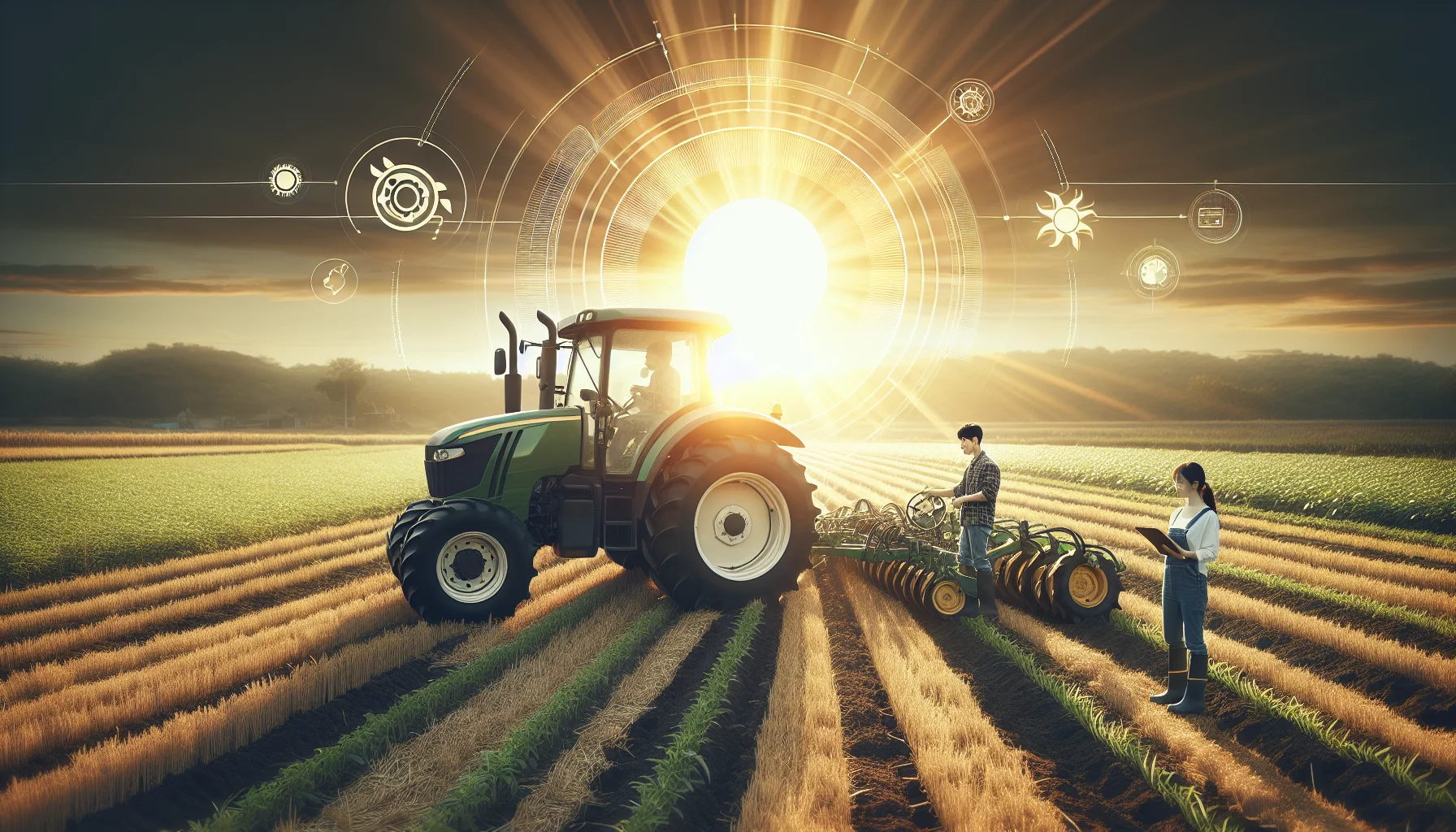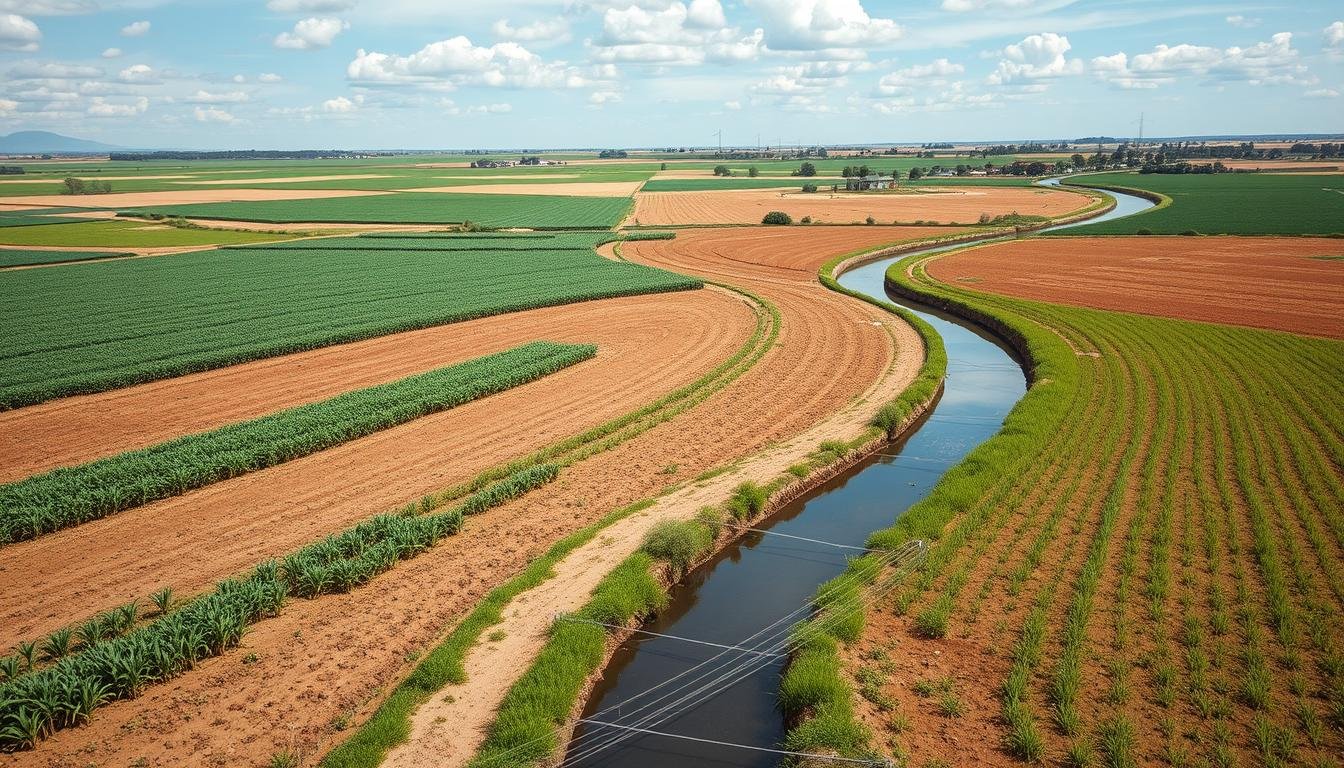Picture this: a vast expanse of green fields stretching as far as the eye can see, dotted with rows of crops and bustling with activity. Amidst the rural charm, a powerful machine stands tall, its engine growling with anticipation. Yes, we’re talking about tractors – the unsung heroes of modern agricultural practices.
From tilling and plowing to planting and harvesting, tractors revolutionize farming operations in countless ways. In this article, we will explore the multitude of benefits that tractors bring to the table, ensuring that you gain a deeper appreciation for these indispensable machines. So, buckle up, and let’s embark on a journey through the fascinating world of tractors and their impact on farming.

Increase Efficiency
Reduced Labor
Tractors are powerful machines that can greatly reduce the amount of manual labor required in farming operations. With the use of tractors, tasks that previously required multiple people and significant physical effort can now be accomplished with ease. This not only saves time and energy but also allows farmers to allocate their human resources to other important areas of their operations.
Time Savings
By harnessing the power of tractors, farmers can complete their tasks in a fraction of the time it would take to do them manually. Tractors enable efficient operation and swift execution of various farming activities, such as plowing, seeding, and harvesting. This time-saving aspect is particularly valuable during time-sensitive operations or when adverse weather conditions threaten to delay the completion of tasks.
Increased Productivity
With the increased efficiency that tractors bring, farming operations can significantly boost their productivity. The speed and power of tractors allow farmers to cover more ground in less time, enabling them to undertake larger-scale projects and complete tasks at a faster pace. This heightened productivity can translate into increased yields and greater overall success for agricultural businesses.
Improved Precision
Accurate Field Operations
Tractors are equipped with advanced technology, such as GPS guidance systems, that enable precise and accurate field operations. These systems allow for precise tracking of the tractor’s path, ensuring that each row is evenly spaced and crops are planted or harvested with precision. This level of accuracy helps farmers achieve optimal crop growth and yield while minimizing the risk of wastage.
Consistent Plowing
Proper plowing is essential for creating an optimal seedbed and ensuring uniform soil cultivation. Tractors equipped with specialized plows can provide consistent and even plowing, resulting in improved seed germination and crop establishment. Consistent plowing also contributes to better water absorption in the soil, reducing the risk of erosion and improving overall soil health.
Precise Seeding and Planting
Tractors equipped with seeding and planting attachments offer precise control over the distribution and depth of seeds, ensuring uniform coverage and germination. This precision reduces the potential for overcrowding or uneven growth, resulting in better crop quality and overall yield. Additionally, precise seeding and planting techniques optimize the use of resources such as seeds and fertilizers, minimizing waste and maximizing productivity.

Enhanced Power and Strength
Ability to Handle Heavy Work
Tractors are built to handle heavy workloads and can easily traverse challenging terrain while towing heavy implements. Their robust design and powerful engines allow them to pull equipment such as plows, cultivators, and harvesters without strain. This ability to handle heavy work relieves farmers from labor-intensive tasks and enables them to tackle more demanding projects with ease.
Traction in Challenging Terrain
Farming often takes place in diverse landscapes, including hilly, muddy, or uneven terrains. Tractors are specifically designed to provide superior traction, ensuring optimal performance even in challenging conditions. Their sturdy tires and powerful engines allow them to navigate through muddy fields, climb inclines, and overcome obstacles, reducing the risk of getting stuck and increasing operational efficiency.
Capability to Pull Heavy Implements
Tractors can tow and operate various heavy implements or machinery, such as planters, sprayers, and balers. This flexibility enables farmers to easily switch between different tasks without needing separate equipment for each operation. The ability to pull heavy implements efficiently and effectively contributes to a streamlined workflow and ensures that farming operations can be carried out smoothly.
Versatility
Adaptable for Various Farming Tasks
Tractors are highly versatile machines that can be used for a wide range of farming tasks. From plowing and harrowing to planting and harvesting, tractors can adapt to the changing needs of different farming operations. This versatility allows farmers to perform multiple tasks using a single machine, saving both time and resources.
Compatible with Different Attachments
Tractors can be fitted with various attachments, expanding their functionality and enhancing their versatility. Attachments such as loaders, mowers, and sprayers enable farmers to handle additional tasks beyond traditional fieldwork. The compatibility with different attachments increases the versatility of tractors and allows for specialized operations specific to the needs of the farm.
Suitable for Multiple Crops
Tractors are compatible with different cropping systems and can be adjusted to meet the specific requirements of various crops. From row-cropping to No-Till Farming, tractors can adapt their equipment and settings to match the demands of different crops and growing methods. This versatility allows farmers to diversify their operations and cultivate multiple crops efficiently using a single machine.

Increased Scale of Operations
Ability to Work in Larger Fields
Tractors enable farmers to work on larger fields and cover more ground in a shorter amount of time. With their power and efficiency, tractors make it possible for farmers to expand their operations and take on larger acreages. The ability to work larger fields allows for increased crop production and potentially higher profits.
Faster Completion of Tasks
Due to their speed and efficiency, tractors enable farmers to complete tasks at a faster rate. Whether it’s plowing, planting, or harvesting, tractors can quickly accomplish these essential farming operations, reducing the time required for completion. Faster task completion translates into increased throughput and allows farmers to allocate more time to other critical aspects of their operations.
Expansion of Farming Operations
The increased scale and efficiency made possible by tractors provide farmers with opportunities to expand their farming operations. With tractors, farmers can take on more significant projects, cultivate additional land, and diversify their crop production. This expansion can lead to increased profitability and the ability to meet growing market demands.
Cost Savings
Reduced Manual Labor Costs
By minimizing the need for manual labor, tractors contribute to significant cost savings for farming operations. The use of tractors reduces the reliance on labor-intensive tasks, which can be time-consuming and expensive. Farmers can utilize their human resources more efficiently, focusing on managerial and strategic activities while reducing labor costs.
Fuel Efficiency and Cost-Effectiveness
Modern tractors are designed with fuel efficiency in mind, allowing farmers to save on fuel costs. With advancements in engine technology and fuel management systems, tractors can operate more efficiently, minimizing fuel consumption while maintaining optimal performance. This fuel efficiency not only reduces the operational costs but also contributes to a more Sustainable Farming practice.
Long-Term Investment
While tractors may require a significant upfront investment, they are long-term assets that contribute to substantial cost savings over time. By reducing labor costs, increasing productivity, and enabling larger-scale operations, tractors provide a return on investment by optimizing overall farm efficiency. Their durability and longevity make tractors a valuable long-term investment for farming operations.

Improved Safety
Reduced Physical Strain on Workers
One of the key benefits of using tractors is the reduced physical strain on farm workers. By mechanizing labor-intensive tasks, tractors minimize the risk of injuries and health issues associated with manual labor. The use of tractors allows workers to operate from a seated position, reducing the strain on their bodies and improving overall safety and comfort.
Protection from Hazardous Environments
Farming operations often involve working in hazardous environments, such as uneven terrain, dense vegetation, or exposure to chemicals. Tractors provide a protective barrier for operators, shielding them from potential dangers and reducing their exposure to hazardous elements. The enclosed cabs of tractors offer improved operator safety, ensuring a secure working environment.
Enhanced Operator Control
Tractors are equipped with advanced control systems, ergonomic seating, and intuitive interfaces, enhancing operator control and safety. The incorporation of safety features such as roll-over protection structures (ROPS) and seat belts adds an extra layer of protection for operators. These safety measures contribute to the overall well-being of farm workers and minimize the risk of accidents during farming operations.
Crop Quality and Yield
Even Distribution of Seeds and Fertilizers
The precise control offered by tractors ensures an even distribution of seeds and fertilizers during the planting process. With accurate placement and dosage, tractors help to achieve optimal seed germination and nutrient uptake, resulting in improved crop quality. Uniform distribution of seeds and fertilizers also reduces the risk of overcrowding or nutrient deficiencies, maximizing overall yield potential.
Uniform Soil Cultivation
Proper soil cultivation is crucial for promoting healthy root growth, nutrient availability, and water absorption. Tractors equipped with specialized implements, such as cultivators, can ensure uniform soil cultivation across the field. This uniformity helps to create an ideal growing environment for crops, allowing for consistent root penetration, adequate nutrient distribution, and efficient water management.
Optimal Plant Growth and Development
Tractors contribute to optimal plant growth and development through their precise and efficient farming operations. Timely cultivation, accurate planting, and proper tillage techniques made possible by tractors help to create optimal conditions for crop growth. This, in turn, leads to higher crop yields, improved crop health, and better overall quality of agricultural produce.

Weather Resistance
Ability to Operate in Different Weather Conditions
Tractors are designed to withstand and operate in various weather conditions, allowing farmers to work regardless of the elements. Whether it’s rain, snow, or extreme heat, tractors can continue their operations, minimizing downtime due to adverse weather. This weather resistance increases the productivity and efficiency of farming operations, ensuring the timely completion of fieldwork.
Minimized Impact of Bad Weather on Farming
Bad weather conditions can have a significant impact on farming operations, causing delays and affecting crop quality and yield. Tractors help minimize the impact of bad weather by enabling farmers to work efficiently and complete essential tasks even during unfavorable conditions. The ability to continue farming operations despite weather challenges reduces the risk of losses and ensures the continuity of farm activities.
Timely Completion of Field Work
By operating in different weather conditions, tractors allow for the timely completion of fieldwork. Whether it is planting before a rainstorm or harvesting before the onset of unfavorable weather, tractors provide the flexibility and speed needed to meet time-sensitive deadlines. This timely completion of fieldwork can play a critical role in maximizing crop yield and quality.
Reduced Environmental Impact
Efficient Use of Resources
Tractors help farmers optimize the use of resources, such as fuel, water, and fertilizers, minimizing waste and reducing their environmental impact. The precise application and distribution capabilities of tractors ensure that resources are used efficiently, preventing overuse or unnecessary depletion of natural resources. This resource efficiency contributes to a more sustainable farming practice.
Precision Application of Inputs
Tractors equipped with advanced technology allow for the precision application of inputs, such as fertilizers and pesticides. By accurately targeting specific areas and applying the right amount, tractors reduce the risk of environmental pollution and minimize the impact on non-target organisms. This precision application enhances the effectiveness of inputs while promoting environmentally friendly farming practices.
Emission Control and Sustainable Practices
Modern tractors are designed with emission control systems that comply with environmental regulations and promote sustainable practices. Low-emission engines and advanced exhaust systems reduce the environmental footprint of tractors, minimizing air pollution and greenhouse gas emissions. Additionally, the use of sustainable practices, such as conservation tillage and cover cropping, can be facilitated by tractors, further reducing the environmental impact of farming operations.
In conclusion, tractors play a crucial role in enhancing farming operations across various aspects. From increasing efficiency and productivity to improving precision and safety, tractors offer numerous benefits for farmers. Their versatility, power, and advanced technology contribute to increased scale of operations, cost savings, improved crop quality and yield, and reduced environmental impact. Tractors have become indispensable tools in modern farming, enabling farmers to meet the demands of the ever-evolving agricultural industry.
In conclusion, tractors stand as the cornerstone of modern agriculture, offering an unparalleled blend of efficiency, precision, power, and versatility. These robust machines are pivotal in transforming agricultural practices, catering to both small-scale farms and large agricultural enterprises. With their ability to enhance productivity, ensure cost savings, and significantly reduce manual labor, tractors are instrumental in promoting the safety and well-being of farm workers. They epitomize human ingenuity and are a crucial ally in sustainably meeting the global food demand.
For those keen on delving deeper into the multifaceted world of tractors, a wealth of resources awaits. Discover the various Types of Tractors & How to Use Them, each suited for specific tasks and environments. Understand the intricacies of Agricultural Machinery: Disc vs. Tine Harrow, and make informed decisions about the tools that best fit your farming needs. If you’re venturing into small-scale farming, gather essential insights on What You Need for Small-Scale Farming, ensuring a smooth and efficient start to your agricultural journey. Lastly, recognize the importance of upkeep with our guide on How to Effectively Maintain Farming Equipment, ensuring the longevity and performance of your valuable machinery.
Embracing the power of tractors in farming operations paves the way for a future where agriculture is not only productive but also sustainable and efficient. As we continue to innovate and adapt, tractors will undoubtedly remain at the forefront of this ever-evolving industry.
What are the main benefits of using tractors in modern agriculture?
Tractors offer numerous benefits including increased efficiency, reduced manual labor, enhanced precision in farming operations, versatility in handling various tasks, and significant cost savings over time.
How do tractors contribute to increased productivity in farming?
Tractors allow for faster completion of farming tasks, precise distribution of seeds and fertilizers, and the ability to work on larger fields, all of which contribute to increased productivity and crop yields.
Can tractors operate in challenging weather and terrain?
Yes, tractors are designed to provide superior traction and can operate efficiently in diverse landscapes and weather conditions, ensuring that farming operations can continue without significant delays.
Are tractors a sustainable option for farming?
Modern tractors are designed with fuel efficiency and emission control systems, making them a more sustainable option that helps in the efficient use of resources and reduction of environmental impact.
What should I consider when maintaining my tractor?
Regular maintenance is crucial for the longevity and performance of your tractor. This includes checking fluid levels, inspecting tires and brakes, and ensuring that all parts are in good working condition. For detailed guidance, refer to our article on How to Effectively Maintain Farming Equipment.
How do tractors improve the precision of farming operations?
Tractors, often equipped with advanced technology like GPS and automated systems, enable precise farming operations. This precision ensures accurate seeding, optimal spacing, and consistent plowing, which are crucial for maximizing crop yields and minimizing resource wastage.
What types of attachments can be used with tractors, and how do they enhance functionality?
Tractors can be equipped with a variety of attachments such as plows, harrows, seeders, sprayers, and mowers. These attachments enhance the tractor’s functionality, allowing it to perform a wide range of tasks from soil preparation and planting to crop maintenance and harvesting.
How does the use of tractors lead to cost savings in agriculture?
Tractors lead to cost savings by reducing the need for manual labor, increasing the speed and efficiency of farming operations, and enabling precise application of inputs like seeds and fertilizers, thereby reducing wastage and improving crop yields.
What should farmers consider when choosing a tractor for their operations?
Farmers should consider factors such as the size and type of their land, the specific tasks they need to perform, the tractor’s power and fuel efficiency, compatibility with various attachments, and the ease of maintenance and availability of spare parts.
What types of attachments can be used with tractors, and how do they enhance functionality?
Tractors can be equipped with a variety of attachments such as plows, harrows, seeders, sprayers, and mowers. These attachments enhance the tractor’s functionality, allowing it to perform a wide range of tasks from soil preparation and planting to crop maintenance and harvesting.
How do tractors contribute to the safety of farming operations?
Tractors contribute to safety by reducing the physical strain on farmers, protecting operators from hazardous environments, and providing enhanced control and stability on rough terrains, thereby reducing the risk of accidents.
What role do tractors play in managing large-scale farming operations?
In large-scale farming operations, tractors are indispensable for efficiently managing extensive fields. They enable quick and uniform fieldwork, facilitate the use of large and sophisticated attachments, and help in effectively managing the increased workload.
How have technological advancements in tractors changed farming practices?
Technological advancements in tractors, such as automation, precision farming tools, and data analytics, have revolutionized farming practices. They have enhanced the efficiency, accuracy, and decision-making process in farming, leading to increased productivity and sustainability.
What maintenance practices are essential for keeping tractors in optimal condition?
Regular maintenance practices for tractors include checking and changing the oil, inspecting and inflating the tires, checking the hydraulic system, ensuring the proper functioning of brakes and lights, and regularly cleaning and storing the tractor properly to prevent rust and wear.
How do tractors help in managing different types of crops and farming methods?
Tractors are versatile machines that can be adapted to various types of crops and farming methods. With the right attachments and settings, they can be used for tasks ranging from soil preparation and planting to crop care and harvesting, making them suitable for diverse farming needs.






